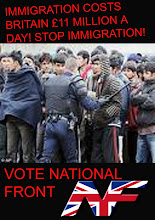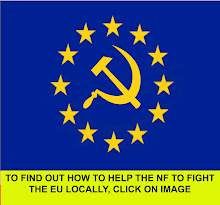
A TIMELY REMINDER TO THE POLICE
I am writing to all police forces within the UK to inform them and advise them of OUR rights under the law, as it is being reported to me by branches across the country that police officers are abusing these hard fought for rights.
I would ask you to insure that your officers are well versed in the Human Rights act as detailed below and suggest that perhaps further training is required in some cases.
The National Front and its members are fed up with the actions of politized police officers across our country. We are no longer prepared to sit back and accept these anti-democratic actions by uniformed bullies.
Examples of the abuses reported are: - Members being asked for their names and addresses’ illegally, when this would not happen with any other parties’ members.
Accusations that leaflets are ‘illegal’, when we check them before they are printed to make sure they are ‘legal’.
General bullying tactics, harassment and hassle and attempts to disrupt the ‘political processes, in itself against the law.
Police officers told that the National Front is racist, being therefore anti-NF and preconditioned to respond in an aggressive manner initially.
We also expect your officers to ‘wear’ their shoulder numbers ‘and’ to indentify themselves with their name, rank and police station when requested as per the law.
There have been many instances reported to us that police officers have over stepped the mark and abused their powers.
We will also in future be instructing our members to demand copies of our images taken by your officers without OUR permission both still and moving re: the Data Protection Act.
For this reason we are instructing our members on their rights and in future should these abuses of power continue the officers concerned will have ‘official’ complaints made against them through the IPCC.
The details of these abuses will also receive prominence on the front page of our website.
We wish to work with the police especially when we are organising demonstrations and will continue to do so, but we demand that police officers treat us as participants in the political process and therefore acting legally.
“Please find below the areas where police training is required”
Article 10, European Convention on Human Rights
Article 10 of the European Convention on Human Rights protects the right to freedom of expression. Before the Human Rights Act 1998 came into force, the right to freedom of expression was a negative one: you were free to express yourself, unless the law otherwise prevented you from doing so. With the incorporation of the European Convention on Human Rights into English and Welsh domestic law, the right to freedom of expression is now expressly guaranteed.
However, the right to freedom of expression in Article 10 is not absolute. Interferences with the right to freedom of expression may be permitted if they are prescribed by law, pursue a legitimate aim and are necessary in a democratic society, that is, satisfy a pressing social need. The legitimate purposes for which freedom of expression can be limited are:
* National security, territorial integrity or public safety.
* The prevention of disorder or crime.
* The protection of health or morals.
* The protection of the reputation or rights of others.
* The prevention of the disclosure of information received in confidence.
* For maintaining the authority and impartiality of the judiciary.
The Historic Right to Peaceful Protest
‘To speak of rights at all in this context is to recognise the constitutional shift which is now in progress.’
Mr Justice Stephen Sedley, November 1999
Public protest is deeply rooted in our political culture. There have been countless times in the past - even in the recent past - when public demonstrations of support for a cause, or opposition to a policy or government, have changed the course of history. 'People power' can be a potent political force, whether at a national or a local level; whether to do with political causes or single issues; whether in support of striking workers or bereaved families, or in opposition to globalisation, or the waging of unjustified wars. When people have nothing else to fight with, it is often their solidarity with each other - to stand together and be counted across communities and even across continents - which proves to be their most powerful weapon.
For as long as there have been governments there have been rules to restrict protest and dissent. Over the centuries the law in this area has developed piecemeal, adapting to the prevailing attitudes and concerns of the governments and courts of the day. This dynamic process reflects the struggle that lies at the heart of public order law - the natural tension between the amount of freedom we demand as demonstrators and the amount of restriction we as electors permit our Parliament to impose.
For centuries, legislators have resisted the notion of positive rights in the field of public protest and political expression. Whilst it might have been said that we were free to do anything which was not otherwise proscribed by law, to say that we had a positive right to assemble, to march together, to chant and to campaign - rights that might be weighed against the undoubted rights of property owners, road users or business people - was to swim against a strong current of judicial thinking and an ever-rising tide of repressive legislation, which appeared to tolerate protest only if it did not challenge or cause inconvenience to anyone. The constitutional shift that fundamentally altered this position was the incorporation into domestic law, in October 2000, of the European Convention on Human Rights (the Convention). In the field of political protest the Convention has effect in four key areas:
• Right to Peaceful Assembly – Article 11
• Right to Freedom of Expression - Article 10
• Right to freedom of thought, conscience and religion – Article 9
• Right to respect for private and family life – Article 8
It forbids any public body, such as the police and local government, from acting in ways that conflict with the principles set out in the Convention.
It enables demonstrators to use the courts, in principle, to challenge decisions that would restrict protest; and might enable them to mount defences to non-violent criminal offences connected with political protest.
Article 11: Freedom of Assembly and Association
1. Everyone has the right to freedom of peaceful assembly and to freedom of association with others, including the right to form and to join trade unions for the protection of his interests.
2. No restrictions shall be placed on the exercise of these rights other than such as are prescribed by law and are necessary in a democratic society in the interests of national security or public safety, for the prevention of disorder or crime, for the protection of health or morals or for the protection of the rights and freedoms of others. This Article shall not prevent the imposition of lawful restrictions on the exercise of these rights by members of the armed forces, of the police or of the administration of the state.
There are two aspects to Article 11. It protects the right to peaceful assembly, which includes the freedom to hold public or private meetings, demonstrations, rallies and sit-ins, without interference from the State.
This may include a positive obligation on the State to ensure that demonstrators are protected from counter-demonstrators trying to prevent their demonstration. However, it does not generally include a positive obligation on the State to ensure that the right to peaceful assembly is protected on private property (Appleby v UK 2003).
Article 11 also protects the freedom to associate with others, including the right to form or join a political party or other group or association, and the right to belong to a trade union. However, the right to join a trade union does not extend to police officers, soldiers and some other groups who work for the Government. Article 11 also guarantees the right not to have to associate with others, including the right not to join a union and imposes a positive obligation on the State to secure this.
Article 11 is a qualified right. This means that an interference with the right can be justified. The circumstances in which an interference can be justified are similar to those which justify an interference with rights under Article 8 (See section headed ‘A qualified right’ under Article 8). You should note that a requirement to obtain prior authorisation or to provide prior information about an assembly will not constitute an interference with the freedom of assembly where the purpose of the requirements falls within one the legitimate aims set out in Article 11(2).
Tom Linden
National Press Officer National Front
Email nfpressoffice@googlemail.com

























2 comments:
Hi,
Police forces sometimes involve in atrocities, misdeeds. This leads to outrage among the public about the police forces. Police recruitment always aims at the selection of candidates with a good behaviour.
We expect police to work hard preventing crime and keeping us safe. To be sure, the vast majority of police officers are dedicated to protecting the public. We are immensely grateful to these law enforcement professionals.
Thank you for your comment.
I too am very grateful for the often great job the British police force do, however, they are increasingly being used to stifle political opposition to the current regime.
Post a Comment